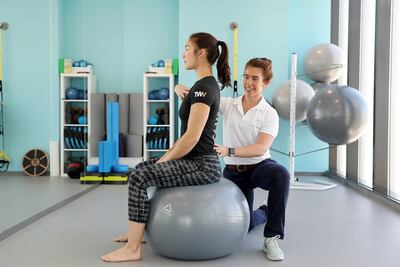Take a quick look around and note the next evolution of humankind: people hunched over their mobile phones, heads jutted forward, shoulders rounded, spines impossibly curved.
The painful phenomenon that has been dubbed “text neck” is caused by technology-related, chronically poor posture that creates muscular changes in the body. Whatever device is the culprit – phone, tablet, laptop or video game – professionals in the UAE who treat the resulting aches and pains are seeing it in record numbers.
There are a host of problems triggered by the stress of a human head consistently facing forward and down, including tightness and pain in the neck and shoulders, headaches and pinching of nerves that can radiate up or down the neck or arms. Because the shoulders are rolled forward, the pectoral muscles tighten, while the overworked muscles across the back become overstretched, elongated and weak. Issues can develop elsewhere, too, as the body tries to compensate.
Brian Lewis, a 40-year-old PR director from Scotland, who regularly shells out hundreds of dirhams for chiropractors and massages to treat his tight neck, recently had it seize up again.
“I think I might have sneezed, because I have a cold this week, and then I felt something go in my neck, I know it because I felt it before,” he said. “But it’s not happening because of the sneeze, it’s happening because there’s something ready to go and a slight turn might do it.”
Although his office setup is good, Lewis frequently works from a laptop at cafes and home.
“I’m checking my phone a lot, with the number of clients who are now WhatsApping and the communication that goes on on WhatsApp and email, yes, constantly on it,” he said.
The people he goes to for help always tell him the same thing, said Mr Lewis.
“Make sure your posture’s right, make sure you are getting up and stretching, getting away from your laptop and moving."
“And I do these things, but sometimes, you know, you just get too involved in your work.”
Amy Gilbert, a physiotherapist who owns and runs Perfect Balance Physiotherapy Centre on Reem Island in Abu Dhabi, says neck cases make up about 50 per cent of her diary, up by half from when she first started working 10 years ago.

“So many people are living a sedentary lifestyle,” she explains. “Their bodies are in that anterior-rotated, forward-leaning posture. That a lot of the time is a catalyst causing other issues, because you’re taking your body out of its natural alignment on a day-to-day basis for eight to 10 hours a day.”
She’s also seeing an increase in the number of children with neck issues and upper back issues.
“A lot of the time I say ‘what do you do in the evening?’ and they say ‘oh, we’re on our computers, we’re on our phones,” she said.
Sarah Aitcheson, a 34-year-old from the UK who works in investor relations, visits Ms Gilbert every few weeks for dry needling to ease the posture-related tightness in her neck.
“Sometimes I’ll try to get a quick massage at the nail salon, but that can aggravate it,” she said. “It’s just like solid stone mass.”
Rania Elias, a senior physiotherapist at Dubai Physiotherapy and Rehabilitation Centre, who last month spoke about the phenomenon of “text neck” at the Abu Dhabi Physiotherapy Conference 2018, says the cases are discernible from the start in about 30 per cent of her patients – particularly in those who are obviously sedentary.
“You can tell while doing the sessions they are checking their phone, their mobile, their social media, you know, and it’s only 45 minutes,” she said. “They cannot live without them…you can tell technology is covering a huge part of their day.”
Although there is a much greater body of research into the impact of technology on human physiology in the West, studies in this region are only starting to emerge.
_________________
Read more:
First UAE robotic surgery performed on hysterectomy patient in Abu Dhabi
Medical inventions have made technology an integral part of health care
Cleveland Clinic Abu Dhabi’s ‘Dr Da Vinci’ performs heart surgeries with robotic precision
___________________
One, conducted at Cairo University in Egypt in 2016, found that students given physical activity and postural improvement training had improvements in their head, shoulder arm and hand pain after the corrective work. Another, at King Saud University in Saudi Arabia in 2016, showed a close relationship between frequent smart phone use and various degrees of neck problems.
One of the major problems Ms Elias sees in Dubai is headaches originating by tense, tired muscles in the neck and shoulders. Advanced stages can experience neck compression, disk herniation and nerve damage.
When Ms Elias treats her patients, she informs them of the basic things they can do to fix their painful issues: hold the mobile in front of the eyes, take breaks, and correct their posture. She even finds herself telling people to watch TV at night rather than their phones – “at least it’s better than the forward head position”, she reasons – but she also advises them to increase their physical activity.
“You can need surgery if you keep your bad habits and your bad posture all the time,” she said. “We have a passive generation coming on, that if they need anything, you have to do it. I tell them physiotherapy is not magical, it’s not magic, even if if I reduce the pain, it will come back again, and again.”
Catch them while they're young
Donna Howarth, an Abu Dhabi sports massage therapist and mum of two, realised her son Tavis was changing shape before her eyes.
The 13-year-old, who regularly transitions between his mobile phone, iPad, laptop and Xbox, regularly sat hunched over, with this head jutting forward and a large curvature in his thoracic spine.
And he’s not alone, she said.
“I can see it with other kids, because they are on their XBox and they are their iPad for such a long period of time, their posture becomes normal, when they are walking around, they are having dinner,” she said. “They are hunched over.”
Howarth knew from the 75 per cent of her massage clients who complain of neck pain – or other problems caused by poor posture – that as Tavis gets older his muscles could become permanently weakened, leading to all sorts of problems. And so she launched into action.
“We’ve moved his XBox, which he used to use either sitting on floor or beanbag,” she said. “Now we make him sit on a chair and put a cushion behind him.”
Howarth regularly reminds Tavis to fix his posture, too.
“Even when he’s walking with his head forward, I walk behind him and get him to get his shoulders back and his chest up,” she said.
Tips to prevent text neck at work
Ms Gilbert, physiotherapist and founder of Perfect Balance Physiotherapy Centre on Reem Island, says you don't have to give up your devices to ease the pain of text neck. Here are her suggestions:
- Make sure all screens, including phones, are brought up to eye level and sit up straight
- Take breaks to change position, get up and stretch for 20 or 30 minutes
- Consider a standup desk but implement the change gradually
- If you work on a laptop regularly, elevate the screen on some books or magazines to eye level, get an external keyboard and mouse, and sit up straight at a table where your hands can be parallel to the board
- Alternate between a standup and sitdown desk
- Stretch: at your desk, in the car, at home and before and after exercise


